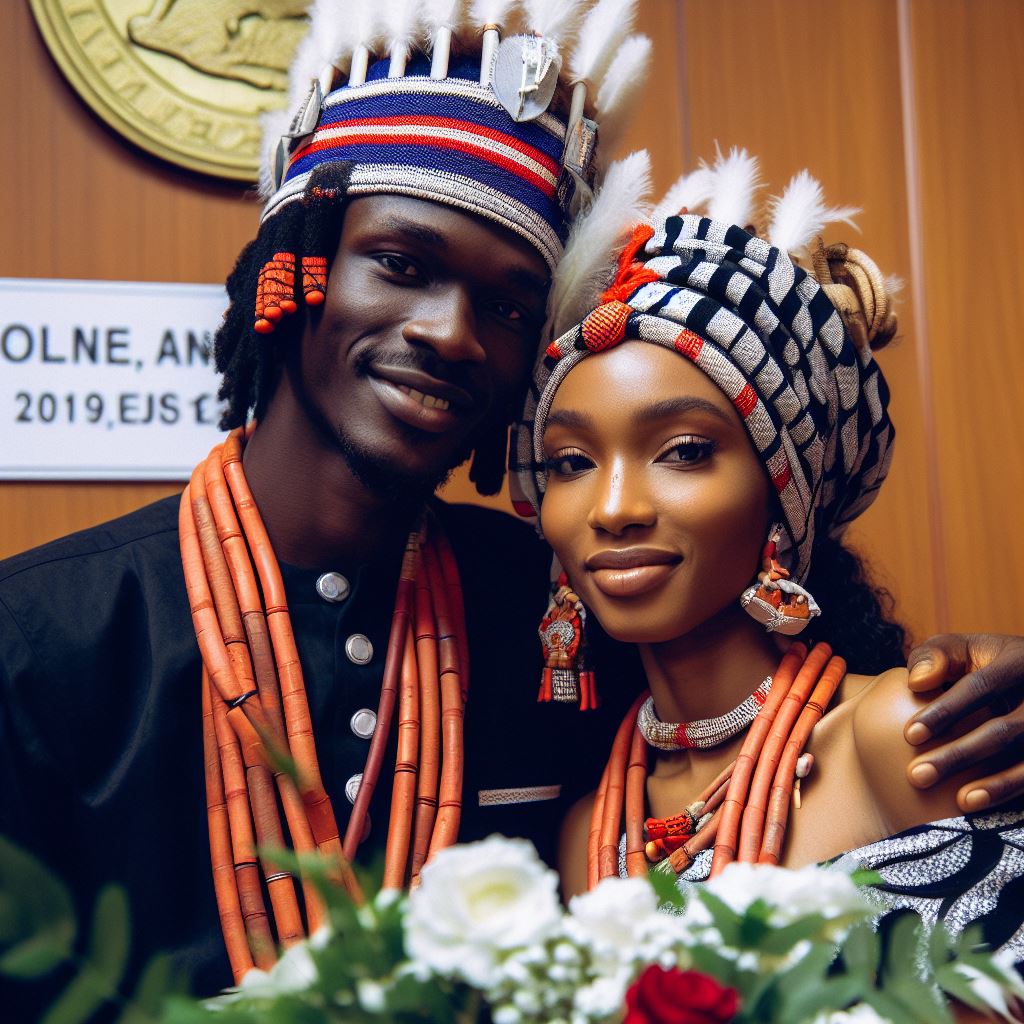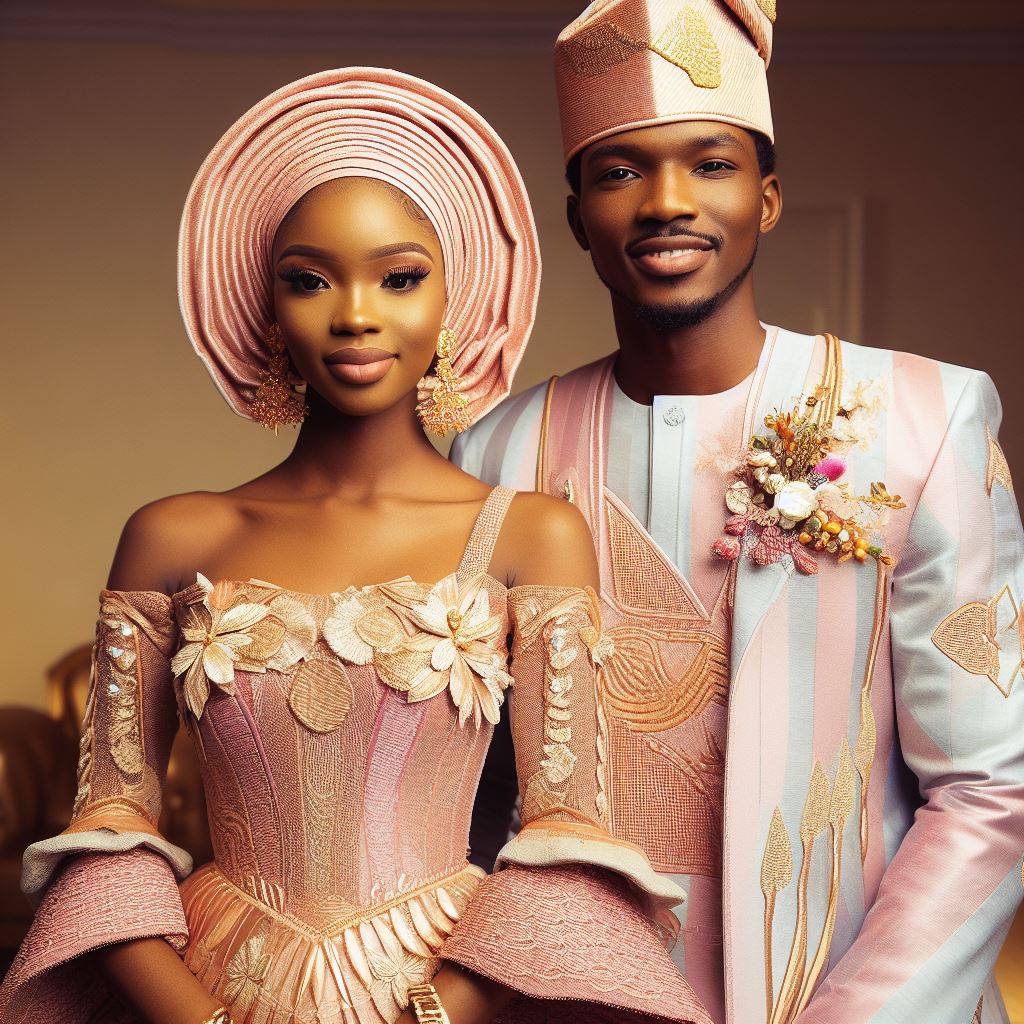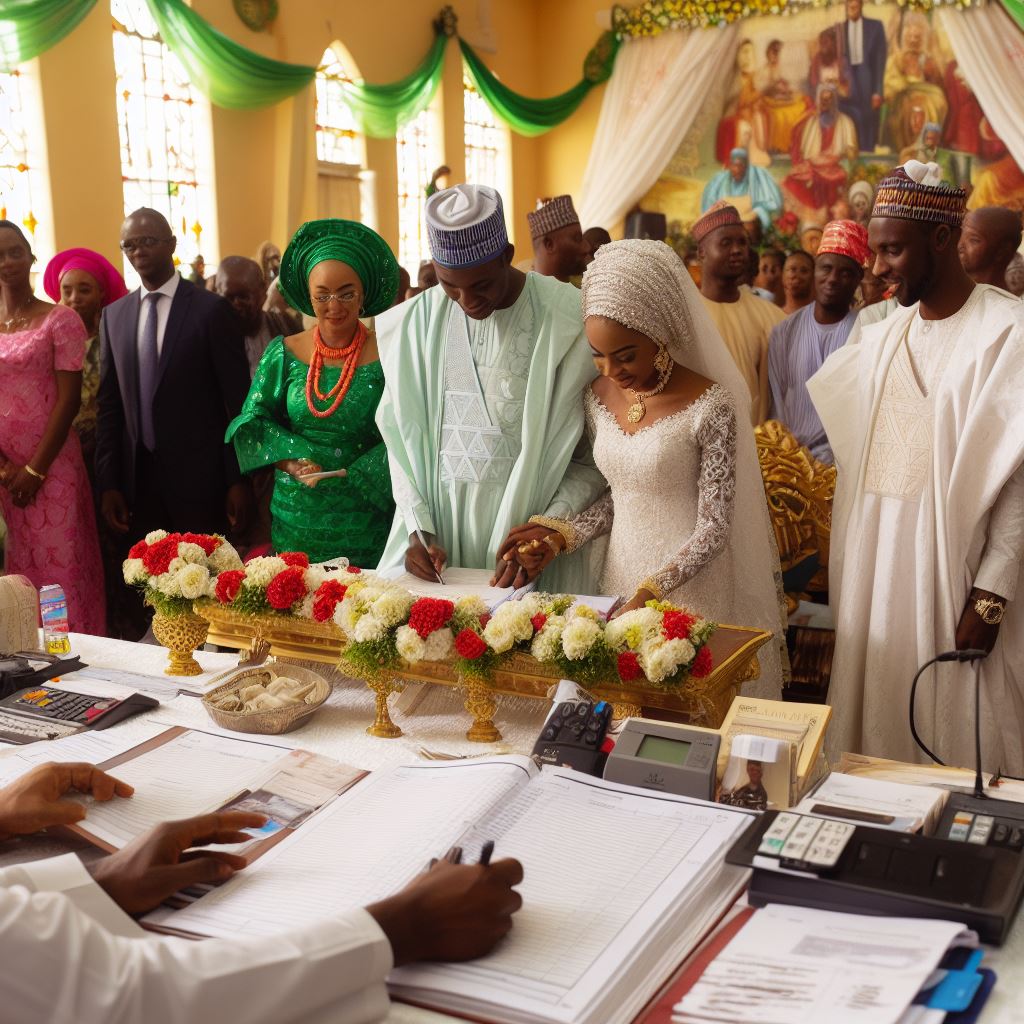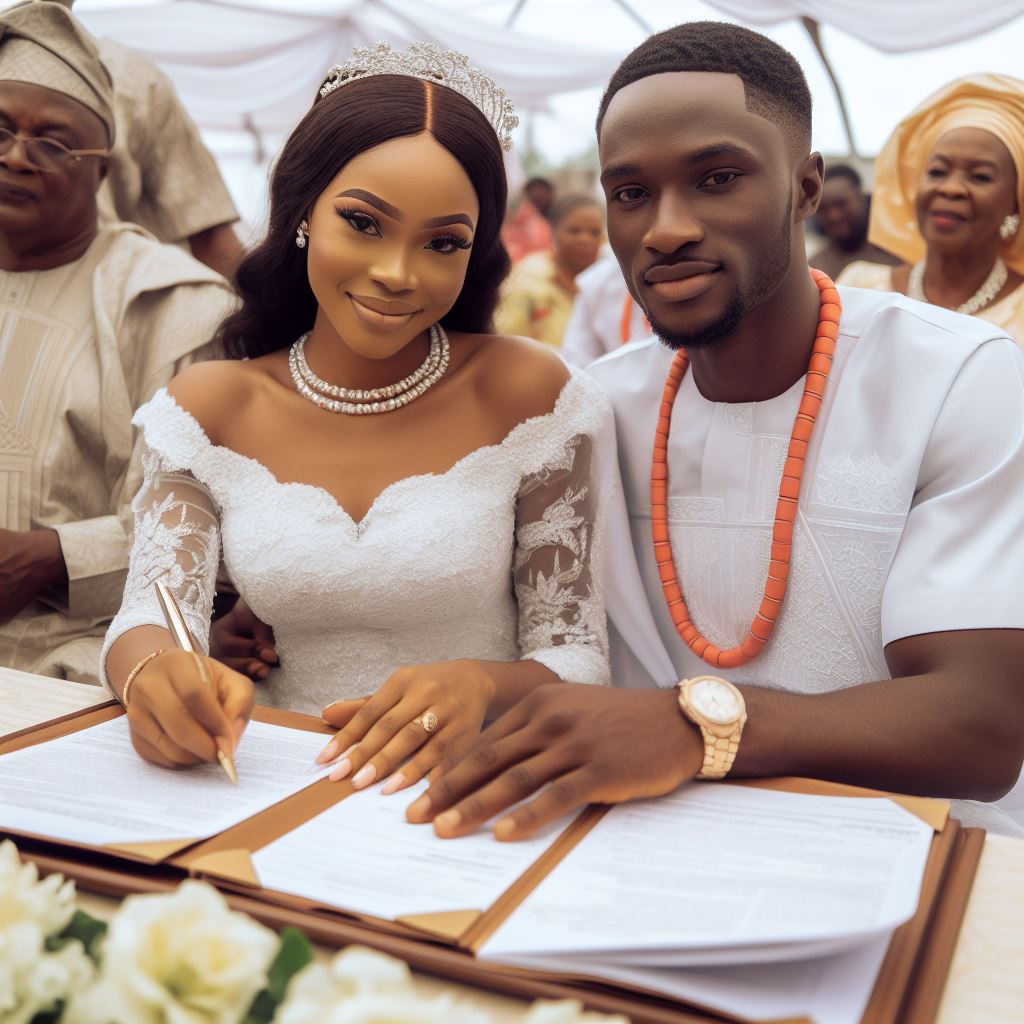Introduction
Inter-tribal marriages at the registry in Nigeria have gained significant importance due to the cultural meets legal aspects.
With the increasing number of inter-tribal marriages in contemporary Nigerian society, it is crucial to understand the implications of this trend.
In Nigeria, where diverse ethnic groups coexist, the legal aspects play a vital role in inter-tribal marriages.
These unions serve as a bridge that connects different cultures and promotes unity among the various tribes.
The significance of cultural meets legal aspects lies in fostering understanding, acceptance, and respect for diverse traditions and customs.
The growing number of inter-tribal marriages in contemporary Nigerian society indicates a positive shift towards a more integrated and multicultural society.
The registry acts as an essential platform for validating these unions, ensuring their legality and recognition.
Inter-tribal marriages at the registry not only bring individuals from different tribes together but also create a unique blend of cultures.
The exchange of traditions, languages, and values leads to cultural enrichment and facilitates social cohesion.
These marriages serve as a powerful means of promoting unity, breaking down ethnic barriers, and fostering national integration.
Furthermore, inter-tribal marriages at the registry contribute to the nation’s development by promoting peaceful coexistence and reducing inter-ethnic tensions.
They provide an opportunity for people from different backgrounds to learn from one another, celebrate diversity, and strengthen the fabric of society.
In this blog section, we will delve deeper into the cultural meets legal aspects of inter-tribal marriages at the registry and explore the impact they have on Nigerian society.
By understanding and appreciating these unions, we can foster a more inclusive and harmonious society.
Cultural Challenges in Inter-tribal Marriages
Inter-tribal marriages bring together couples from different tribes, each with its unique set of cultural differences and challenges.
These unions often highlight the contrasting traditions, customs, and practices, which can lead to potential conflicts regarding language, food, dress, and social norms.
It is vital for couples in inter-tribal marriages to understand and respect each other’s cultures to foster harmony and unity.
Differences in Traditions, Customs, and Practices
When individuals from different tribes come together in marriage, they bring with them distinct traditions, customs, and practices.
These differences can range from the way ceremonies are conducted to how families are involved in decision-making.
For instance, one tribe may have a more elaborate marriage ceremony, while another may focus on the participation of extended family members.
Understanding and appreciating these differences is key to building a strong foundation in an inter-tribal marriage.
Potential Conflicts Regarding Language, Food, Dress, and Social Norms
Language, food, dress, and social norms are integral elements of any culture, and inter-tribal marriages may encounter conflicts related to these aspects.
Communication can become challenging when couples speak different languages or dialects, leading to misunderstandings and frustration.
Additionally, differing culinary preferences and dietary restrictions can create tensions during mealtime.
Dressing styles and social norms, such as greetings and gestures, that vary across tribes can also pose challenges.
Open and respectful discussions about these differences are necessary to find common ground and build mutual understanding.
The Importance of Understanding and Respecting Each Other’s Cultures
Understanding and respecting each other’s cultures is fundamental to the success and happiness of inter-tribal marriages.
It allows couples to appreciate the richness and diversity of their backgrounds, creating a sense of unity despite the differences.
By recognizing the value of cultural exchange, partners can learn from each other and grow together.
Moreover, embracing one another’s cultures enhances the couple’s ability to navigate various social contexts and ensures they honor and preserve their traditions for future generations.
The Role of Communication and Compromise
Communication plays a vital role in overcoming cultural challenges in inter-tribal marriages.
Effective communication ensures that both partners feel heard and understood, enabling the resolution of conflicts.
Active listening, expressing emotions openly, and seeking clarification can foster empathy and prevent misunderstandings.
Compromise also plays a crucial role in finding common ground in cultural differences.
By acknowledging individual needs and finding shared values, couples can strike a balance that allows both parties to feel respected and appreciated.
Embracing Cultural Fusion and Adaptation
Inter-tribal marriages offer a unique opportunity for the fusion of cultures, creating a rich tapestry of traditions.
Couples can creatively blend elements from both tribes to forge new traditions that reflect their joint identity.
By embracing adaptation, inter-tribal couples can navigate the challenges more effectively and create a sense of belonging for themselves and their future family members.
This flexibility and willingness to incorporate the best of both worlds can strengthen the bond between partners and their respective communities.
Inter-tribal marriages bring together individuals from different tribes, introducing a variety of cultural challenges.
By recognizing and appreciating these differences, couples can navigate potential conflicts regarding traditions, customs, language, food, dress, and social norms.
Communication, understanding, and respect are key in building a successful inter-tribal marriage that embraces cultural fusion and promotes unity.
By embracing each other’s cultures and finding common ground, inter-tribal couples can create a harmonious and fulfilling life together.
Read: Honoring Years Together: Special Anniversary Prayers for Nigerians
Legal Considerations in Inter-tribal Marriages
Legal framework for marriages in Nigeria
- Marriages in Nigeria are governed by the Marriage Act, which outlines the legal requirements.
- The Act recognizes both religious and customary marriages, allowing couples to choose according to their beliefs.
- For a marriage to be legally recognized, it must be registered at the appropriate registry.
- Marriages conducted under customary law must also be registered at the Customary Court of the area.
Requirements for a valid marriage at the registry
- Couples must be at least 21 years old, or 18 years old with parental consent.
- Both parties must give their free and voluntary consent to the marriage.
- They must provide valid proof of identity, such as a passport or national identity card.
- Witnesses must be present during the ceremony and sign the marriage register.
- The marriage must be conducted by a licensed registrar at the registry.
Potential legal issues when marrying someone from a different tribe
- Inter-tribal marriages may face challenges due to differences in customs, beliefs, and traditions.
- There could be conflicts regarding the choice of religious or customary marriage, as each tribe has its preferred practices.
- Family and societal pressures can create tensions, especially if one tribe feels they are losing their cultural identity.
- In some cases, tribal laws may not be recognized by the state, causing confusion and legal complications.
The need to meet the legal requirements while preserving cultural values
- It is crucial for couples to understand and fulfill the legal requirements for marriage in Nigeria.
- At the same time, they should respect and preserve their cultural values and traditions.
- Communication and mutual understanding between the couple and their families can help navigate any conflicts.
- Seeking legal advice from professionals experienced in inter-tribal marriages can provide guidance on potential hurdles.
- Ultimately, by combining legal compliance and cultural preservation, inter-tribal marriages can thrive and promote unity.
Basically, inter-tribal marriages in Nigeria require attention to both legal and cultural aspects.
Understanding the legal framework, meeting the requirements at the registry, and addressing potential legal issues are important steps for a successful marriage.
Balancing these legal considerations with the preservation of cultural values is crucial for harmony in inter-tribal unions.
By embracing both legal requirements and cultural traditions, couples can navigate the complexities and enjoy the richness of a diverse society.
Read: Inspiring Anniversary Prayers for Lasting Love in Nigeria

Benefits of Inter-tribal Marriages
Inter-tribal marriages bring a myriad of advantages and positive aspects to individuals, communities, and societies.
Let’s explore some of these benefits:
Promotion of Cultural Exchange and Unity
- Inter-tribal marriages provide a platform for the exchange of cultural practices, beliefs, and traditions.
- By marrying someone from a different tribe, individuals gain a firsthand understanding of a different culture.
- This exchange fosters tolerance, appreciation, and respect for diverse cultural backgrounds.
- Communities become more inclusive and diverse, promoting societal unity and harmony.
Potential for Shared Experiences and Learning
- Inter-tribal marriages offer an opportunity for couples to experience and learn from different ways of life.
- Through interactions with their spouse’s tribe, individuals broaden their horizons and gain new perspectives.
- Shared experiences create stronger bonds between partners, leading to more enriched relationships.
- The blending of traditions and customs creates unique and vibrant marital celebrations.
Impact on Future Generations, Fostering Acceptance and Inclusivity
- Children born to inter-tribal couples inherit a rich cultural heritage from both sides.
- These children grow up with an appreciation for diversity and become bridges between their two tribes.
- Future generations benefit from a wider worldview, embracing inclusivity and acceptance of others.
- Intermarriage decreases the possibility of tribal conflicts as families create connections across tribal lines.
In fact, inter-tribal marriages have numerous benefits that contribute to the overall development of individuals and societies.
By promoting cultural exchange and unity, these marriages foster acceptance and inclusivity.
The potential for shared experiences and learning enriches relationships.
Moreover, the impact on future generations helps create a more tolerant and harmonious world.
Read: Thanking God for Another Year: Nigerian Marriage Prayer Points
Tips for Successful Inter-tribal Marriages at the Registry
Marrying someone from a different tribe can bring together two beautiful cultures, but it can also present unique challenges.
In order to ensure a successful inter-tribal marriage at the registry, there are several tips to keep in mind.
Open Communication is Key
First and foremost, open communication is essential for a successful inter-tribal marriage.
Couples should discuss their expectations, desires, and concerns openly and honestly.
This will help establish trust and understanding from the very beginning.
Embrace Understanding and Compromise
Understanding and compromise are crucial when it comes to navigating different cultural traditions and practices.
Both partners need to be open to learning about and embracing each other’s customs, while also finding a middle ground that respects both backgrounds.
Appreciate Each Other’s Cultural Background
Acknowledging and appreciating each other’s cultural backgrounds is a key aspect of building a strong foundation in inter-tribal marriages.
By valuing and respecting each other’s heritage, couples can create an environment of acceptance and celebration.
Seek Support from Families and Communities
The support of both families and communities is vital for a successful inter-tribal marriage.
Engage in open discussions with parents and extended family members, educating them about the benefits of embracing diversity and love.
Seek support from both tribes’ communities to foster a sense of belonging and acceptance.
Learn and Participate in Both Tribal Traditions
To create a harmonious and inclusive marriage, it’s important for both partners to learn about and actively participate in each other’s tribal traditions.
This can include attending cultural events, learning traditional dances, or participating in festive celebrations.
By actively engaging in each other’s customs, couples can establish a stronger bond.
Educate Yourself about Legal Rights and Obligations
Inter-tribal marriages may have legal implications, depending on the jurisdiction.
It’s crucial to educate yourself about the legal rights and obligations that exist in your specific location.
Consulting legal experts or professionals who specialize in inter-tribal marriages can provide guidance and ensure a smooth legal process.
Be Prepared for Potential Challenges
Although inter-tribal marriages can be incredibly rewarding, it’s important to be prepared for potential challenges that may arise.
These challenges can range from language barriers and cultural misunderstandings to dealing with societal prejudice.
By anticipating these obstacles, couples can proactively address them and build a stronger partnership.
Maintain a Strong Support System
Building a support system that includes other inter-tribal couples or individuals can provide invaluable guidance and encouragement.
Connect with support groups or online communities to share experiences, seek advice, and gain insights from others who have navigated similar journeys.
Therefore, inter-tribal marriages at the registry can be fulfilling and enriching.
By following these tips, couples can lay the groundwork for a successful and harmonious union that embraces both their unique cultural backgrounds.
Remember, love transcends boundaries and with open minds and hearts, inter-tribal marriages can flourish.
Read: Strengthening Marital Bonds: Yoruba & Igbo Anniversary Prayers
See Related Content: The Challenges of Polygamy: Balancing Love and Respect
Conclusion
Inter-tribal marriages at the registry in Nigeria hold great significance in promoting cultural diversity and unity.
Throughout this blog section, we have discussed the challenges, legal considerations, and benefits associated with these marriages.
It is important to understand that inter-tribal marriages bring people from different cultures together, fostering a sense of understanding and acceptance.
By embracing a cultural meets legal approach, individuals can navigate through the challenges and legal processes involved with grace and respect.
Despite the legal considerations, such as differing marriage laws and customs, inter-tribal marriages offer numerous benefits.
They contribute to the preservation of cultural heritage, as well as the formation of stronger familial and societal bonds.
These marriages help break down prejudices and stereotypes, promoting harmony and equality.
Through this blog section, we hope to encourage individuals to pursue inter-tribal marriages.
By breaking barriers and embracing cultural diversity, we can create a more inclusive and tolerant society.
It is crucial to value and respect each other’s cultural differences, fostering intercultural unity and growth.
In review, inter-tribal marriages at the registry play a vital role in promoting cultural harmony and unity in Nigeria.
By approaching these unions with a cultural meets legal perspective, we can overcome challenges and celebrate the rich diversity within our society.
Let us strive to build a future where intercultural unity thrives, allowing us to achieve societal growth and prosperity.




